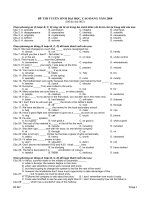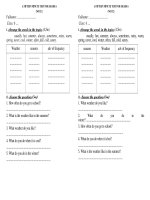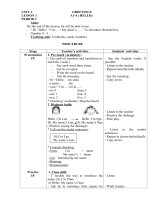TIẾNG ANH 6 - REVISION 6
Bạn đang xem bản rút gọn của tài liệu. Xem và tải ngay bản đầy đủ của tài liệu tại đây (216.27 KB, 3 trang )
<span class='text_page_counter'>(1)</span><div class='page_container' data-page=1>
<i><b> REVISION 6 </b></i>
<i><b>1.Read the following passage and mark the letter A, B, C, or D on your answer sheet to </b></i>
<i><b>indicate the correct word or phrase that best fits each of the numbers blanks. </b></i>
Television is one of man‟s most important means of (1)……... It brings pictures
and sounds from around the world into millions of homes. A person with a television set
can sit in his house, and he can watch the president make a speech or visit a foreign
country; He can see what happening and watch statesmen try to bring about
peace.Through television, home (2)…….can see and learn about people, places, and
things in far-away lands. Television also provides more entertainment programmes
(3)……any other kind. The programmes include plays or dramas, light comedies, sporting
events, and motion pictures. So(4)……..now plays an important role in many people‟s
lives. It is more convenient as well as cheaper for people to sit comfortably at home than
to go out.
<b>Question 1: A. communication </b> B. transport C. way D. equipment
<b>Question 2: A. teachers </b> B. doctors C. viewers D. looker
<b>Question 3: A. to </b> B. from C. of D. than
<b>Question 4: A. television </b> B. radio C. network D. communication
<i><b>2.Read the following passage and mark the letter A, B, C, or D on your answer sheet to </b></i>
<i><b>indicate the correct answer to each of the questions. </b></i>
Tsunamis, whose name derives from the Janese expression for „ high wave in a harbour‟,
are giant sea waves. These waves are quite diffetent from storm surges. They are also
referred to by the general public as tida waves although they have nothing to do with tides.
Scientists often refer to them as seismic sea waves, which is far more appropriate because
they are often the result of undersea seismic activity.
Tsunamis can be caused when the sea floor suddenly moves, during an underwater
earthquake or volcano, and the water above the moving earth is suddenly displaced. This
sudden shift of water sets off a series of waves. These waves can travel great distances. At
speeds close to 700 kilometres per hour. In the open ocean, tsunamis waves are not very
high, often no more than one or two metres. It is when they hit the shallow waters near the
coast that they increase in height, posibly up to 40 metres.
<b>Question 1: Tsunamis can be caused when the sea floor suddenly ... </b>
A. moves B. flows B. waves D. changes
<b>Question 2: The word „ them „ in the passage refers to... </b>
A. tidal waves B. tsunamis C. storm surges D. sea waves
<b>Question 3: It can be understood from the passage that tsunamis... </b>
A. cause severe damage in the middle of the ocean.
B. General reach heights greater than 40 metres
C. Are far more dangerous on the coast than in the open ocean
D. Are often identified by ships on the ocean
<b>Question 4: The passage mainly discusses... </b>
</div>
<span class='text_page_counter'>(2)</span><div class='page_container' data-page=2>
<i><b>3.Read the following passage and mark the letter A, B, C, or D on your answer sheet to </b></i>
<i><b>indicate the correct word or phrase that best fits each of the numbers blanks. </b></i>
On Saturday morning, a mudslide (1)………down the Ngan Pho River near the
small village of Huong Son District, Ha Tinh province. Authorities(2)…………..eight
dead, eight injured, and as many as 108 people (3)……… The two-square-kilometre
path of the mudslide also(4)…………,,about 50 homes. A local resident said that the
mudslide was caused by ground which has been made unable by heavy rainfall.
<b>Question 1: A. moving </b> B. to move C. moved D. are moving
<b>Question 2: A. is confirmed </b> B. have confirmed C. confirming D. confirmed
<b>Question 3: A. missing </b> B. missed C. have miss D. be missed
<b>Question 4: A. destroying </b> B. to destroy C. has destroyed D. destroyed
<i><b>4.Read the following passage and mark the letter A, B, C, or D on your answer sheet to </b></i>
<i><b>indicate the correct answer to each of the questions. </b></i>
Alexander Graham Bell is widely known as the inventor of the first telephone. He
was born on March 3rd, 1847 in Edinburgh, Scotland. When he was 23, Bell emigrated to
Canada with his parents and the next year moved to the United States to teach deaf-mute
children. He took great interest in transmitting the human voice. With his colleague
Thomas Watson, Bell worked very hard on the experimentation to invent devices such as
the <i>harmonic telegraph</i> (used to send multiple messages over a single wire) and
<i>phonautograph</i> (use to draw the shape of the sound waves). The first telephone
communication was said to have happened between Bell and Watson in 1876 while Bell
was at one end of the line, and Watson worked on the telephone in another room. The first
transmitted words were, “Mr Watson, come here. I want to see you.”
<b>Question 1: Where was Alexander Graham Bell born? </b>
A. England B. Scotland C. Britain D. The United States
<b>Question 2: What is Bell‟s “harmonic telegraph”? </b>
A. is used to make call and multiple messages over a single wire.
B. is used to send multiple messages over a single wire.
C. is used to send a multiple message over a single wire.
D. is used to draw the shape of the sound waves.
<b>Question 3: When did the first communication over the telephone happen? </b>
A. 1876 B. 1786 C. 1847 D. 1784
<b>Question 4: What does the word „deaf-mute’ in line 3 mean? </b>
A. can‟t speak B. can‟t hear
</div>
<span class='text_page_counter'>(3)</span><div class='page_container' data-page=3>
<b>KEY </b>
<b>READING 1 1.A </b> <b>2.C </b> <b>3.D </b> <b>4.A </b>
<b>READING 2 1.A </b> <b>2.A </b> <b>3.C </b> <b>4.C </b>
<b>READING 3 1.C </b> <b>2.B </b> <b>3.A </b> <b>4.D </b>
</div>
<!--links-->









